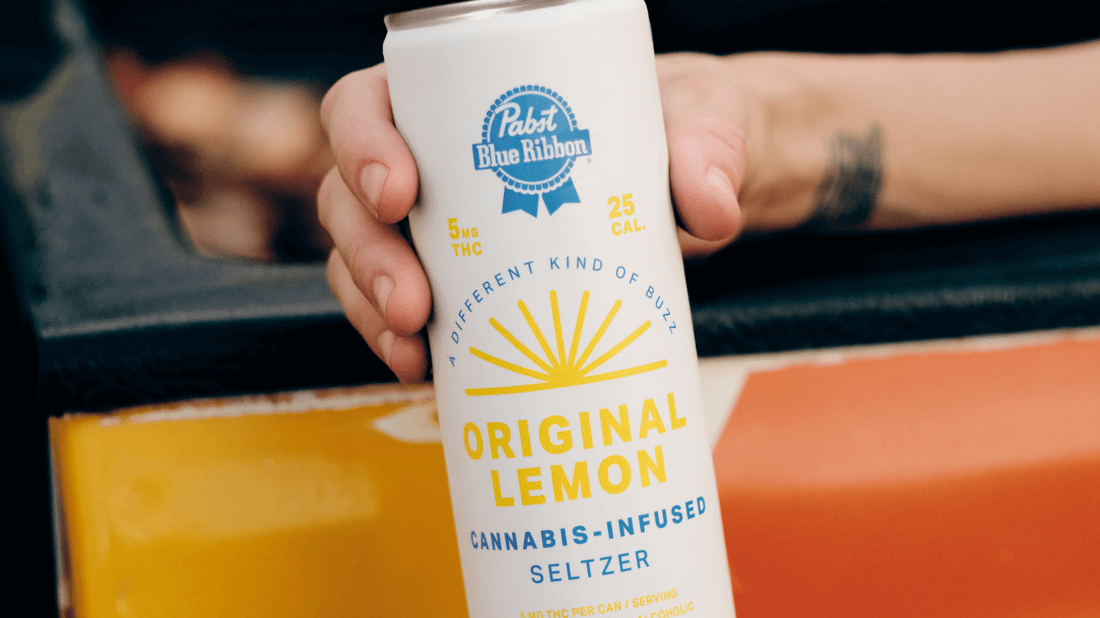
Enlarge this image
Cans of Pabst Blue Ribbon cannabis-infused lemon seltzer are non-alcoholic, with 5mg of THC. A four-pack costs $24.
Cans of Pabst Blue Ribbon cannabis-infused lemon seltzer are non-alcoholic, with 5mg of THC. A four-pack costs $24.
Pabst LabsCans of lemon seltzer spiked with the psychoactive ingredient in cannabis – and branded with the famous Pabst Blue Ribbon logo — are rolling out in California, in a new sign of the growth of THC-infused drinks.
While a THC seltzer may seem like a niche product, it's actually part of a larger pattern, where big companies want to learn more about a part of the cannabis market that could see explosive growth in the next few years.
And with dosage amounts becoming more predictable, THC drinks are increasingly being compared to beer.
"The response has been overwhelming," says Mark Faicol, the brand manager at Pabst Labs. "And right now our challenge is really producing enough product to keep up with demand from retailers."
The new seltzer is non-alcoholic, but it contains 5mg of THC, or tetrahydrocannabinol, along with purified water, lemon concentrate, sugar and other flavors. It's now being sold in cannabis dispensaries, costing $24 for a four-pack. The seltzer is also sold online, with delivery possible in Los Angeles, Sacramento, the Bay Area, and Humboldt County.
Pabst Labs is run by former PBR employees. Their connections eased the path to put the Pabst brewery's name on cans that promise a different kind of buzz to PBR consumers.
Canna-curiosity
So, who's the target consumer for a THC seltzer?
It's aimed at what Rick Maturo, Nielsen's associate director of client services for cannabis practice, calls the "canna-curious" — people who might have some experience with marijuana, but aren't frequent users. Now they're being offered cannabis in a format that doesn't require smoking, vaping, or eating.
Faicol says the single-serving cans and low- to medium-dosage of THC should also help ease concerns of getting too intoxicated. He adds that the liquid extract in the seltzer will help people gauge its effects.
"It's going to have an onset time of 20 to 30 minutes, which is a lot quicker than many other edible products," he says, adding that wary drinkers could also stop halfway through a can to further control their dosage.
Maturo says some people already view THC beverages in much the same way they see alcoholic beverages.
"Certainly it's a way to relax and unwind at the end of the day," he says.
"People are using it for what we refer to as 'experience enhancement,' so just taking a regular activity and adding a new spin to it, with either THC in this case or in some cases alcohol," Maturo says.
PBR cannabis seltzer began appearing in dispensaries around two weeks ago. That quiet rollout is now being expanded, with an eye toward eventually reaching markets outside of California.
"Everyone wants it — our first initial production sold out immediately, the same with our second production run," Faicol says.
A growing market
Faicol says the THC beverage market is predicted to eventually be worth billions of dollars. But for now, the sector is pretty small. THC drinks represented only about 1% of all legal cannabis sales in 2019 – totaling around $64 million, Maturo says. Those figures reflect California, Colorado, Washington, Oregon and Nevada — five states where cannabis has been legal long enough for Nielsen to compile a year's worth of data.
For the THC beverage market to grow, it will have to overcome several hurdles, from marijuana's murky regulatory standing to social norms that often support drinking Bud, not bud. Then there are the logistical challenges of making, transporting and selling drinks — something that many cannabis companies have little experience in.
But rapid growth could come if legalization spreads. Maturo cites Nielsen data that shows "a pretty big jump" in public interest in drinking THC-infused beverages if they become legally available — which could translate into growth of about 400% by 2025.
"About five times the number of folks are interested in consuming a THC beverage than what we see in terms of consumption right now," he says.
The right dose?







